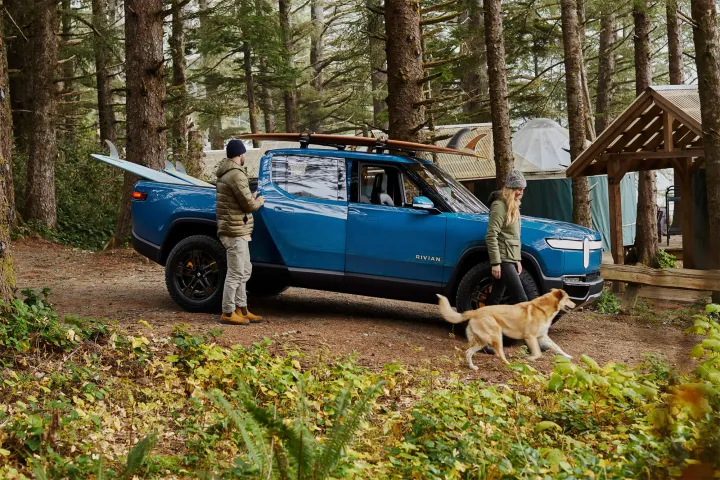
The Rivian R1T electric pickup truck now gets 410 miles of range with the new Max Pack battery and Dual-Motor powertrain, the company claims.
Rivian posted range estimates for the Max Pack, which is not available with Rivian’s Quad-Motor powertrain, on X (formerly known as Twitter) on Wednesday, but those haven’t been confirmed by the Environmental Protection Agency (EPA). The 410-mile range estimate applies to trucks with 21-inch wheels. Opting for 22-inch wheels knocks the estimated range down to 380 miles. The available 20-inch wheel and all-terrain tire combination — which helps maximize the R1T’s impressive off-road capability — brings a further range reduction, to 355 miles.
The EPA previously posted official range ratings for some R1T Dual-Motor models with the middle Large Pack, which has a capacity of 135 kilowatt-hours compared to 180 kWh for the Max Pack. Large Pack, Dual-Motor models are rated at 352 miles and 341 miles with 21-inch and 22-inch wheels, respectively. In its social media post, Rivian also added a 307-mile estimate for Large Pack models with the 20-inch wheels and all-terrain tires, but that hadn’t been posted on the EPA’s website at the time of publication.
Rivian will post range estimates for Dual-Motor versions of the R1S SUV at a later date, but the same powertrain specs apply to both vehicles. The Dual-Motor powertrain produces 533 horsepower and 610 pound-feet of torque in standard form, allowing for a manufacturer-estimated zero to 60 mph time of 4.5 seconds. A Dual-Motor Performance tune increases output to 665 hp and 829 lb-ft of torque, dropping the zero to 60 mph time to 3.5 seconds.
The Quad-Motor powertrain, which is what the R1T and R1S launched with, is rated at 835 hp and 908 lb-ft, but that’s only good for a half-second improvement over the Dual-Motor Performance in zero to 60 mph acceleration. Thanks to the availability of the Max Pack, the R1T Dual-Motor is now also the range champ. The best the Quad-Motor version can manage is 321 miles.
Order books for the standard Dual-Motor and Dual-Motor Performance are open now. The Max Pack option is also available for the R1T, and will be added to the R1S configurator at a later date. Dual-Motor R1T models start at $80,800 with the Large Pack and $90,800 with the Max Pack. The Dual-Motor Performance option costs $85,800 with the Large Pack and $95,800 with the Max Pack. A smaller Standard Pack is also be available with the the Dual-Motor powertrain in both the R1T and R1S, but isn’t expected to start shipping until 2024.



